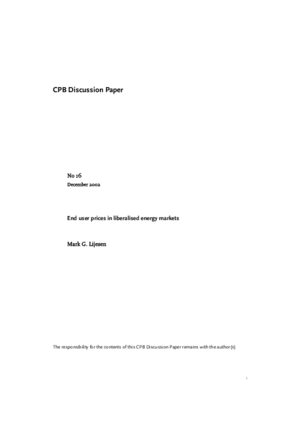End user prices in liberalised energy markets
Competition lowers energy expenditures for end-users
These are the conclusions from CPB Discussion Paper 16, End user prices in liberalised energy markets.
This Discussion Paper describes a retail and wholesale model for liberalised energy markets. The model shows that retailers impose cost-based per unit prices. The standing charge, a monthly fee paid by the end-user, is used to collect rents because an increase in the standing charge will not decrease demand, as opposed to an increase in per unit prices. Retailers will lower standing charges to compete for market share as markets grow competitively.
Model simulations show that the average price for end-users of energy will decrease as the number of retailers in the market rises. Likewise, a cost advantage for one or several retailers will lead to lower standing charges, as do lower switching costs.
CPB's conclusion of decreasing average retail prices is conditional on stable wholesale prices. In an earlier publication, Economie, energie en milieu: Een verkenning tot 2010 (Economy, energy and the environment: an outlook until 2010, only available in Dutch), CPB finds that increasing concentration in electricity production may lead to an increase in wholesale prices. Large users will, on average, pay 2 percent more for electricity in 2010 than they did in 2000. For small users, for whom the standing charge takes a larger share in total expenditure, average prices will fall by about 3.5 percent. In the case of natural gas, both wholesale prices and standing charges will decrease, leading to a cumulative decrease in average prices of 18 and 9 percent for large and small users respectively.
As European energy markets move towards deregulation, energy prices shift from classic ‘cost plus' prices towards market prices.
We develop a model for the retail and wholesale energy markets in Europe, based on Bertrand competition in a two part pricing structure with switching costs. We use the model to forecast end user electricity and natural gas prices and find that the introduction of competition in energy retail and wholesale markets will decrease standing charges, lowering total costs for energy users. A larger number of entrants, a cost advantage for one of the suppliers, or lower switching costs reduces standing charges further.
